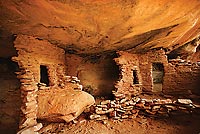The pursuit of science appears to be relatively straight forward and for most of how it’s taught, it is. Science is process and repetition. However, try as we might, scientists inevitably impart their own thoughts, biases, and culturally constructed training into the process. This is a well-accepted part of the scientific process and scientists work to make those limitations clear by reporting the details of their methodology, explaining the process of data interpretation and concluding result, and opening up our work to the scrutiny of our professional and academic peers. 
Even still, there are multiple ways of knowing and understanding the world around us that have scientific merit. Interpreting scientific processes and results through the different ways of knowing, or different theoretical paradigms opens up scientific dialog while still working through the rigors of the scientific process. When scientists discuss their methodologies, interpretation of data, and concluding results with acknowledgment of those different ways of knowing, generally that involves a discussion of scientific theory. Theory is most commonly used in qualitative scientific pursuits (social “soft” sciences), but does have applicability in quantitative scientific (“hard” sciences) pursuits as well.
The tenets of objectivism, otherwise known as processualism, or positivism, is the most commonly employed theory in quantitative science. This theory basically says that the person or persons conducting the scientific work have no personal input into the process or conclusions. The scientific work is exclusively guided by the tenets of the hypothesis, the methodology, the collected data, and results. Objectivism is confirmed by the repetition and replicability of the experiment. This suite of theories falls very much within modern Western ways of knowing.
By greatest contrast, the opposite end of the scientific spectrum is informed by the tenets of Critical theory and Post-modernism.
 Post- modernism suggests that there is no impartiality or objectivity because people think and act out through the lens of their own culture. As a result, there are different ways of understanding the world around us and we cannot extract ourselves from the lens of our cultural perspectives. To circumvent this postmodernist Scholars, work to identify and present their cultural biases and their work so that through their transparency others can deduce a truth of the study. Post- modernism suggests that there is no impartiality or objectivity because people think and act out through the lens of their own culture. As a result, there are different ways of understanding the world around us and we cannot extract ourselves from the lens of our cultural perspectives. To circumvent this postmodernist Scholars, work to identify and present their cultural biases and their work so that through their transparency others can deduce a truth of the study.
Critical theory addresses the political and society and science and is as the name suggests critical of what objectivity misses. Science informs our everyday life and has an impact on each and every one of us, critical theory when incorporated in science asks what is the impact of this or any work and is it true to our lived experiences or our ideals. The suite of critical theory includes critical race Theory, feminist Theory, queer Theory, and punk Theory.
Scientists can use and intertwine theories to inform them on the ethics and importance of the work they do!
|